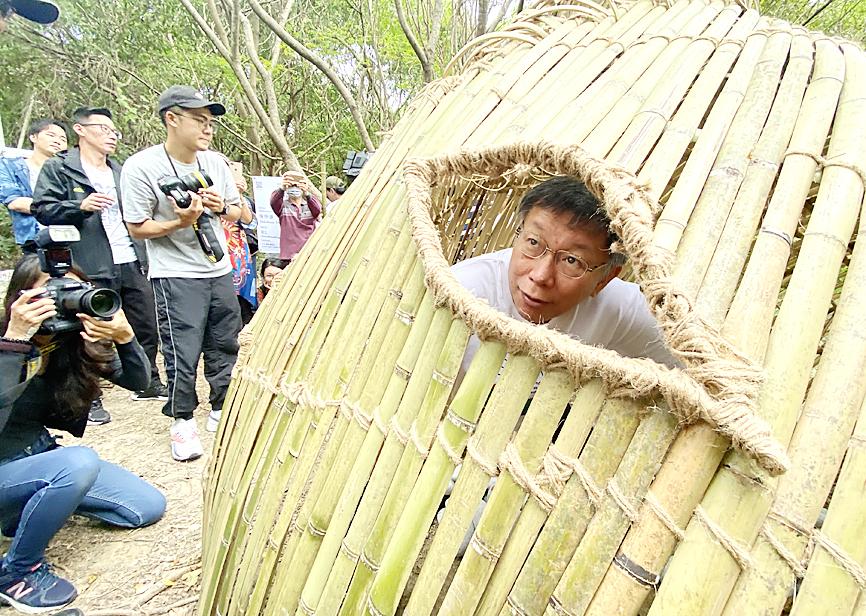Taipei Mayor Ko Wen-je (柯文哲) yesterday criticized the central government for allowing imports of US pork products containing ractopamine residue, but banning the use of the leanness-enhancing feed additive by Taiwan’s pig farmers.
“My attitude is simply ‘yes or no’ — [the government] just [needs to] clearly explain the policy and publicize the procedure, and we will raise our hands with questions if we have different opinions,” Ko said.
He made the remarks on the sidelines of the opening ceremony for the Guandu International Nature Art Festival after reporters asked him to elaborate on earlier comments about the plan to relax restrictions on Jan. 1 on imports of US pork products, as well as beef from cattle aged 30 months or older.

Photo: Chien Jung-fong, Taipei Times
The central government should not mislead the public, since most people think the policy only applies to US pork, but it might end up allowing the importation of pork containing ractopamine from other countries, as businesspeople would make changes to earn a profit, he said.
“Is it not strange that imported pork can contain ractopamine, but Taiwanese pork cannot… And the government says it is safe to eat, but the Ministry of Education tells students not to eat it and the Ministry of Defense has ordered military personnel not to eat it. Did you not say it is safe to eat?” he said.
The controversy must be resolved through two principles — source management and clear labeling — and the central government must clearly state how it plans to manage questions about country of origin, border controls and the traceability of imported pork products, so that local governments can decide how to deal with the issue, the mayor said.
“We will not deliberately be destructive, and we understand that Taiwan faces a difficult international situation, including pressure from the US, but if the central government can clearly explain its policy, then local governments can try to help deal with it, or at least say that we cannot meet the policy if it is not feasible,” he added.
In related news, Council of Agriculture Minister Chen Chi-chung (陳吉仲) yesterday responded to Ko saying on Saturday that he wanted to ask the minister just how much pork containing ractopamine would be imported in the first year after the ban is lifted.
Chen said not every country is allowed to export pork to Taiwan, amid precautions against foot-and-mouth disease and African swine fever, and at present, just 13 countries do so, with about 84,000 tonnes imported last year.
After the ban is lifted on Jan. 1, the US is likely to be the only country to export pork containing ractopamine to Taiwan, and the total volume would depend on two factors: the government’s supplementary measures, including the clear labeling of pork and pork-containing processed food at restaurants and retailers, and the government’s NT$10 billion (US$345.72 million) fund to aid the domestic pig farming industry, Chen said.
Additional reporting by CNA

Taiwanese scientists have engineered plants that can capture about 50 percent more carbon dioxide and produce more than twice as many seeds as unmodified plants, a breakthrough they hope could one day help mitigate global warming and grow more food staples such as rice. If applied to major food crops, the new system could cut carbon emissions and raise yields “without additional equipment or labor costs,” Academia Sinica researcher and lead author the study Lu Kuan-jen (呂冠箴) said. Academia Sinica president James Liao (廖俊智) said that as humans emit 9.6 billion tonnes of carbon dioxide compared with the 220 billion tonnes absorbed

The Taipei Mass Rapid Transit (MRT) Wanda-Zhonghe Line is 81.7 percent complete, with public opening targeted for the end of 2027, New Taipei City Mayor Hou You-yi (侯友宜) said today. Surrounding roads are to be open to the public by the end of next year, Hou said during an inspection of construction progress. The 9.5km line, featuring nine underground stations and one depot, is expected to connect Chiang Kai-shek Memorial Hall Station to Chukuang Station in New Taipei City’s Jhonghe District (中和). All 18 tunnels for the line are complete, while the main structures of the stations and depot are mostly finished, he

Taipei is to implement widespread road closures around Taipei 101 on Friday to make way for large crowds during the Double Ten National Day celebration, the Taipei Department of Transportation said. A four-minute fireworks display is to be launched from the skyscraper, along with a performance by 500 drones flying in formation above the nearby Nanshan A21 site, starting at 10pm. Vehicle restrictions would occur in phases, they said. From 5pm to 9pm, inner lanes of Songshou Road between Taipei City Hall and Taipei 101 are to be closed, with only the outer lanes remaining open. Between 9pm and 9:40pm, the section is

China’s plan to deploy a new hypersonic ballistic missile at a Chinese People’s Liberation Army Rocket Force (PLARF) base near Taiwan likely targets US airbases and ships in the western Pacific, but it would also present new threats to Taiwan, defense experts said. The New York Times — citing a US Department of Defense report from last year on China’s military power — on Monday reported in an article titled “The missiles threatening Taiwan” that China has stockpiled 3,500 missiles, 1.5 times more than four years earlier. Although it is unclear how many of those missiles were targeting Taiwan, the newspaper reported